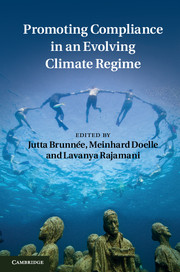Book contents
- Frontmatter
- Contents
- Contributors
- Preface
- Abbreviations
- Introduction: The role of compliance in an evolving climate regime
- Part I Context
- Part II The Kyoto compliance system: Features and experience
- Part III Compliance and the climate regime: Issues, options, and challenges
- 7 The role of non-state actors in climate compliance
- 8 Facilitation of compliance
- 9 Enforcing compliance in an evolving climate regime
- 10 Financial mechanisms under the climate regime
- 11 Post-2012 compliance and carbon markets
- 12 Compliance and the use of trade measures
- 13 ‘Comparability of efforts’ among developed country parties and the post-2012 compliance system
- 14 From the Kyoto compliance system to MRV
- 15 Compliance in transition countries
- 16 Developing countries and compliance in the climate regime
- 17 The role of dispute settlement in the climate regime
- 18 Depoliticizing compliance
- Part IV A look forward
- Bibliography
- Index
10 - Financial mechanisms under the climate regime
Published online by Cambridge University Press: 05 January 2012
- Frontmatter
- Contents
- Contributors
- Preface
- Abbreviations
- Introduction: The role of compliance in an evolving climate regime
- Part I Context
- Part II The Kyoto compliance system: Features and experience
- Part III Compliance and the climate regime: Issues, options, and challenges
- 7 The role of non-state actors in climate compliance
- 8 Facilitation of compliance
- 9 Enforcing compliance in an evolving climate regime
- 10 Financial mechanisms under the climate regime
- 11 Post-2012 compliance and carbon markets
- 12 Compliance and the use of trade measures
- 13 ‘Comparability of efforts’ among developed country parties and the post-2012 compliance system
- 14 From the Kyoto compliance system to MRV
- 15 Compliance in transition countries
- 16 Developing countries and compliance in the climate regime
- 17 The role of dispute settlement in the climate regime
- 18 Depoliticizing compliance
- Part IV A look forward
- Bibliography
- Index
Summary
Introduction
The discussion on provision of finance related to multilateral environmental agreements has always involved political speeches with generous pledges and tirades with expressions of frustration. In the context of this book on compliance and climate change, the focus of a chapter on finance could not be other than a discussion on how parties have met or fulfilled their binding international legal obligations in the climate change regime. Therefore, an initial step in this analysis is to assess the main provisions on financial resources set out in the UN Framework Convention on Climate Change (FCCC) and canvass how the financial mechanism within it was established. The second section of this chapter examines the main barriers and concerns related to the provision of financial resources. The third section is devoted to the attempts that have been made to improve implementation of the convention in respect of the provision of financial resources and investment. The focus of the discussion will be on the developments between 2007 and 2010, that is, beginning with COP-13, in Bali, up until COP-16, in Cancun. The chapter also provides a brief description of the main mechanisms in the new financial architecture that has been taking shape. In the final section, the chapter offers some reflections on why compliance with finance commitments by means of providing adequate funding to developing countries is not only a way to encourage wider participation in the climate change regime, but also a sound investment in lower emissions and a safer future for all.
Provision of financial resources under the climate change regime and related barriers and concerns
Developing countries face significant financial and other constraints. As a result, economic and social development and the eradication of poverty tend to be their main priorities. These two factors are the main barriers against a more robust engagement of developing countries in the implementation of environmental norms, including those within the climate change regime. In order to reduce inequities among states and encourage wider participation in the implementation of commitments, the FCCC and the Kyoto Protocol (KP) established a framework for the provision of financial resources.
- Type
- Chapter
- Information
- Promoting Compliance in an Evolving Climate Regime , pp. 216 - 239Publisher: Cambridge University PressPrint publication year: 2011



